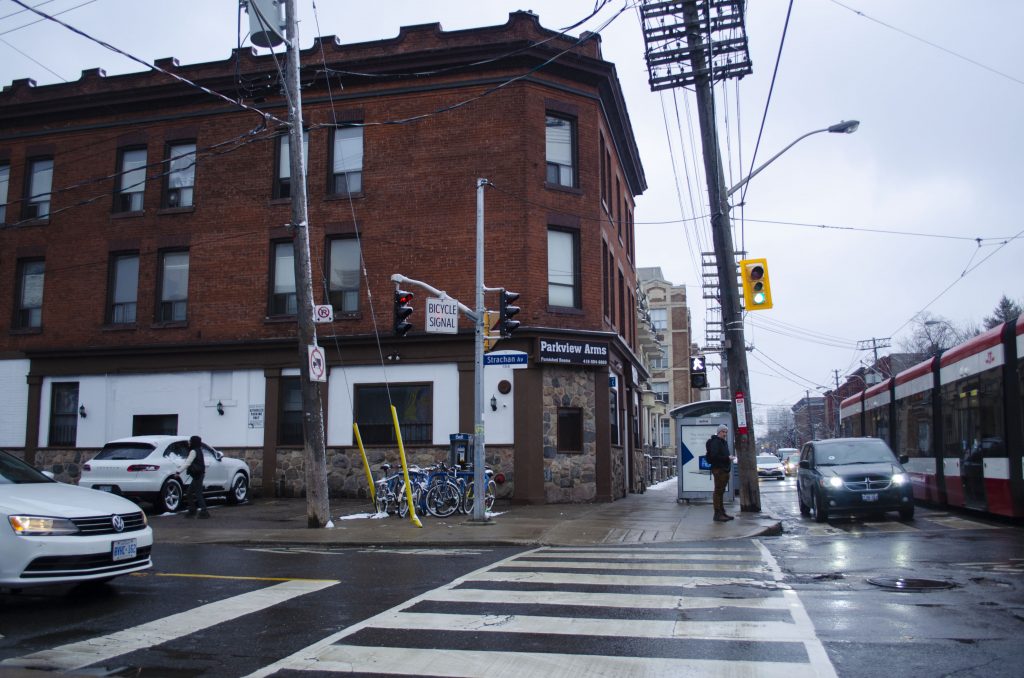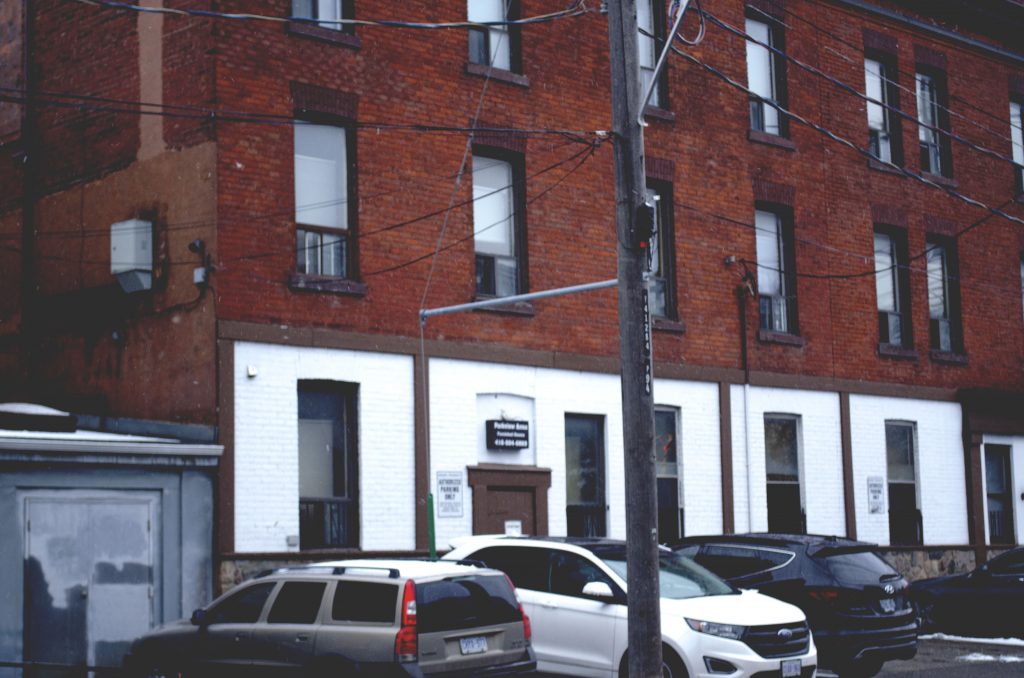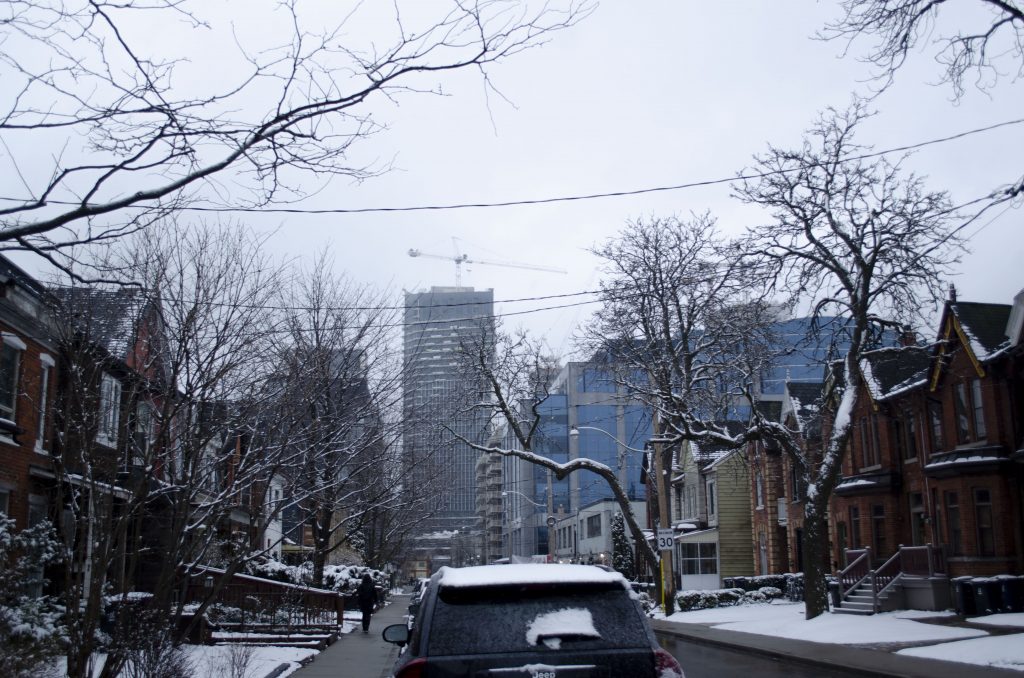
The Parkview Arms Hotel sits across Trinity Bellwoods Park on Queen St. West (Photo credit: Brian Capitao)
Toronto is in an affordable housing crisis.
There are less affordable housing developments than luxury condominiums. Toronto is one of a number of major cities that faces a population boom with inadequate social housing. In downtown Toronto, Queen Street has become one of the most unaffordable places as it is overrun with boutique shops and high-rent.
Few places offer refuge to the transient, despite more people becoming displaced.
I arrive on a snowy afternoon. A shirtless pot-bellied man is struggling to open the door to his room as I walk-in for a tour.
I am inside the walls of the Parkview Arms hotel. An anachronistic housing development lost in time. The walls inside have been painted over in teal to cover decades of decay. As I walk up the stairs, it smells of cigarette smoke. It’s quiet during the day; all you can hear is the murmur of a tv set coming from one of the rooms. I am instructed to go three-quarters down the hall and my room is on the right.
It is a small room built for one person. A single room occupancy (SRO) unit. It is minimalistic with “tan walls” complete with plastic drawers to put folded clothes, and an open closet. There is an old tube tv set and a small bed with freshly cleaned covers that Jeff put on a memory foam mattress still covered in plastic.
This hotel is one of the last vestiges of a now bygone Toronto.

The windows of the hotel are barred (Photo credit: Brian Capitao).
I walk back down and speak to the owner, Jeff. A white-haired man in his late 50s with old-school glass frames. His family has been in the business for over 60 years, with him personally managing the hotel for 27 years.
“Places like this are dwindling. There are illegal boarding houses but big places like this are few and far between,” says Jeff.
A couple of hours later, I hear a man outside the room in the hallway yelling. He is seemingly unable to open the door to his room. A staff member, presumably Jeff, tries to quell the man’s anger.
“I’m broke. I don’t have money right now. I’ve been here for four years,” the man pleads.
The man is pacified after the staff member agrees to let him stay on a while longer.
Housing and housing development have become critical issues in the 21st Century. Property is no longer seen as a place to be lived in but an investment. Housing has gone through a process called financialization.
It’s more than just gentrification. Housing is alienable. In a modern-day market, housing properties are transferable through digital transactions all over the world.
Condominiums are being built rapidly, and affordable housing for everyday people becomes harder to attain. The condos are becoming an existential threat to the city, looming in the background.

Down the street from the Parkview Arms is a residential street with condos and boutique marketing and design agencies built around the area. (Photo credit: Brian Capitao)
Not too far from the hotel is a residential street with hipster design agencies tucked between alleyways, and a convenience store that has been converted into a fully functioning sitdown Vietnamese restaurant. It’s one of the cheapest things to eat nearby. I’m thankful as there is no food or food allowed at the Parkview Arms hotel, save for a lone vending machine and microwave on each floor used to heat up frozen dinners. The restaurant attracts a mixture of haggard-looking people and downtown hipster types working for marketing agencies.
The restaurant no doubt is a byproduct of the creative means that the owners have had to come up with to make rent. At the back are two apartments. It would seem that even thrifty and clever business owners seem to struggle with affordable housing.
Inside the restaurant, I order a bowl of soup. I notice that while the convenience store has transformed, it still offers fundamental convenience store functions like a fully-operational lottery kiosk and convenience store fridges with sliding doors that house cold beverages.
After lunch, I venture back to my room. The hallway is so narrow that the room across mine can see into my room if I open the door.
I notice that most of the residents here are males from varying ethnicities but mostly similar in age. These are men who look like they have become institutionalized by the system.
Governments need to make affordable housing a priority. Housing controls where we work, our sense of community, and ultimately our sense of well-being.
It’s not just the homeless or the underclass that won’t have a pot to piss in if things don’t change. But also the working class Vietnamese family running a shop in a city that has prioritized money over basic human need.